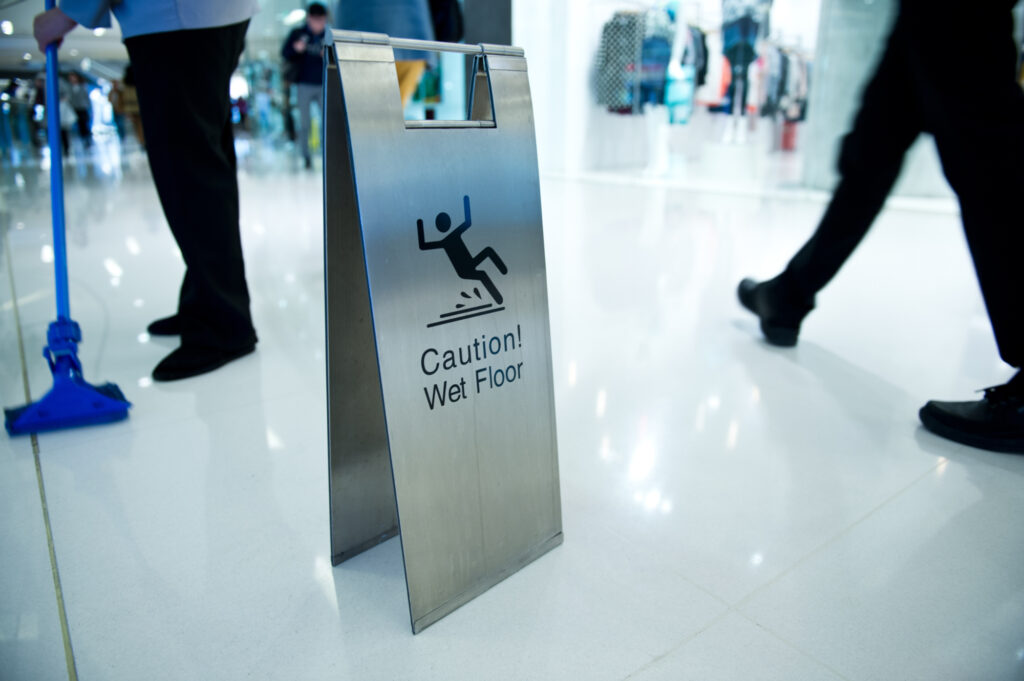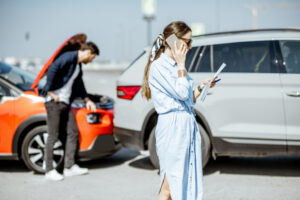Slip and fall accidents happen in common places we visit every day, such as restaurants, grocery stores, and retail stores. But when someone falls and gets injured due to a hazard that should have been addressed, it’s more than bad luck; it may actually be negligence.
In Florida, victims of these accidents can file a personal injury claim to seek compensation for medical expenses, lost wages, and other damages. However, you need more than an accident report to recover compensation in a legal claim. You need to prove negligence.
Here’s what that means, and how an experienced personal injury attorney from KFB Law who specializes in slip and fall cases may be able to help.
Common Damages in Slip and Fall Claims
Slip and fall injuries can range from minor bruises to life-altering trauma. If you were hurt due to someone else’s negligence, you may be able to recover compensation for:
- Medical bills (including future treatment)
- Lost wages
- Loss of earning capacity
- Pain and suffering
- Emotional distress
- Property damage
- In some cases, punitive damages (for gross negligence)
No matter how minor your fall may seem, always seek medical attention. Some injuries—especially back or head injuries—may not show symptoms right away but can lead to long-term issues.
Understanding the 4 Components of Negligence in Florida Law
To build a successful personal injury case in Florida, you must prove the four components of negligence:
- Duty of Care – The property owner or occupier (such as a restaurant or grocery store) owed a legal duty to keep the premises reasonably safe for customers.
- Breach of Duty – That party failed to exercise reasonable care, such as not cleaning up a spill or leaving obstacles in walking paths.
- Causation – The breach directly caused the plaintiff’s injury.
- Damages – The injury resulted in real harm, leaving the accident victim with medical bills, lost wages, or emotional distress.
Every slip and fall case must check all four boxes. Miss one, and negligence isn’t established, which means no valid negligence claim.
Slip and Fall Hazards by Location
Different types of businesses face different risks. Generally, Florida law (specifically §768.0755) requires a business to have actual or constructive knowledge of a dangerous condition and fail to correct it in order to be held liable. If the spill was there long enough that an employee should’ve noticed, that may be enough to prove the proximate cause of negligence.
What does negligence look like in common retail environments? Here are a few examples.
1. Restaurants
Restaurants can be dangerous when staff fail to clean up spills or debris. Potential common hazards include wet or greasy floors, cracked or uneven tiles, poor lighting, and cluttered walkways.
In Florida, restaurants owe a duty to customers to inspect for hazards and correct them in a timely manner. If someone slips on a spill that went unaddressed for 20 minutes during a lunch rush, that could be considered a breach of duty.
2. Grocery Stores
Grocery stores face constant risks from leaking freezers, dropped produce, and restocking hazards, which can cause slippery floors due to spilled liquids. Water tracked in from outside by customers or deliveries and stock carts or boxes left in aisles can also cause harm.
3. Retail Stores
Retail stores often manage clutter, product displays, and high customer volumes. Some risks include those where it can be shown that the defendant breached safety protocols, such as merchandise left on the floor, torn carpeting, broken escalators, and poorly maintained entrances.
In these cases, proving that the store should have been aware of the issue under the same or similar circumstances is key. For example, if 20 customers walked past a pile of clothes in an aisle before someone tripped, the store’s inaction might show a breach of duty occurred.
Evidence That Helps Prove Negligence
It can be challenging to prove negligence and recover maximum compensation. A strong personal injury attorney will know how to gather and present evidence that supports all four elements of negligence.
Here’s what helps in determining how damages may finally be awarded :
- Surveillance video of the fall and the scene beforehand
- Witness statements
- Incident reports from store management
- Photographs of the scene and the hazard
- Maintenance logs
- Medical records linking the fall to the injury
The more evidence you have, the harder it is for the business or insurance company to argue that something else caused your injury, or that the hazard wasn’t there long enough to be addressed.
Comparative and Contributory Negligence in Florida
Florida law follows the modified comparative negligence standard. That means if you were partially at fault, your compensation can be reduced by the amount you were considered negligent.
For example, if a jury finds you 20% responsible (maybe you were texting when you slipped), you can still recover damages, but your award will be reduced by 20%.
However, if you’re found to be more than 50% at fault, you cannot recover compensation under Florida’s current law. That’s why working with a personal injury lawyer who knows how to push back against unfair blame is critical.
When to Contact a Personal Injury Lawyer
Wondering if it’s time to speak with a lawyer? If any of the following apply, it’s worth having a conversation:
- You slipped or fell in a public or commercial space due to a hazard
- You’re dealing with medical bills, missed work, or ongoing injuries
- The business is blaming you or denying responsibility
- Key evidence may be disappearing (e.g., video footage erased, hazard cleaned up)
- You’re unsure how to deal with the insurance company
Even if you’re not sure whether you have a claim, getting trusted legal guidance early on can protect your rights and strengthen your case.
Talk to a Personal Injury Lawyer Who Puts You First
Get a Free Consultation From KFB Law
A slip and fall accident can change everything in an instant. When someone else’s negligence is to blame, you have the right to seek accountability and legal support.
At KFB Law, we believe your story matters. Our personal injury attorneys serve the greater Tampa Bay area with the experience, respect, and personal attention every client deserves. If you’ve been injured at a restaurant, grocery store, retail store, or any other establishment, we’re here to listen and guide you forward.
Your first consultation is free and comes with no obligation. Let’s have a straightforward conversation about what happened and explore how we can help.
Call KFB Law today to schedule your free consultation.
FAQs About Proving Negligence in Slip and Fall Cases
What if there was a warning sign?
A warning sign (like “Caution: Wet Floor”) can help a business avoid liability, but it doesn’t automatically protect them. If the sign wasn’t visible or placed in the wrong spot, it might not matter.
Can I sue if I tripped over something obvious?
Florida law considers whether a reasonable person would have seen and avoided the hazard. However, distractions, lighting, and crowd levels all factor in. A qualified attorney can help assess this.
What if the store fixed the issue right after I fell?
This may be seen as remedial action and might not be admissible in court to prove negligence. That’s why it’s essential to gather evidence promptly, including photos, witness names, and other relevant details.
Does it matter how long the hazard was there?
Yes. Under Florida law, a store is only liable if it had actual or constructive knowledge of the danger. Surveillance footage or witness statements can help show how long the issue existed.
Is there a deadline to file a claim?
Yes. Florida’s statute of limitations for most personal injury claims is two years from the date of injury. Missing this window could bar you from recovering compensation. It’s best to act as soon as possible.



